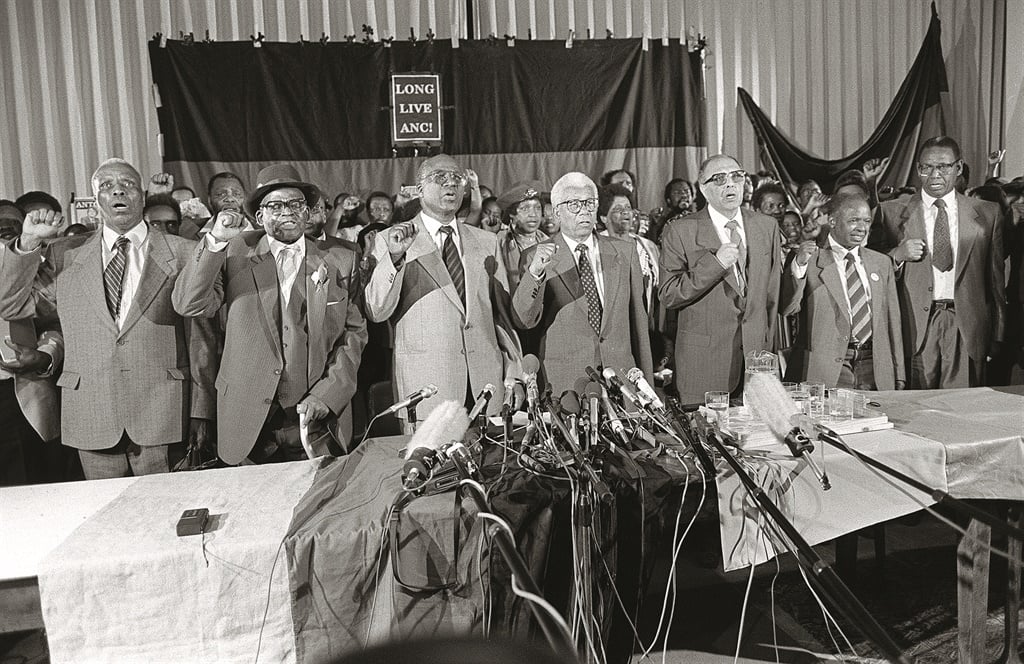


Anti-apartheid ANC struggle stalwarts Raymond Mhlaba, Oscar Mpetha, Andrew Mlangeni, Walter Sisulu, Ahmed Kathrada, Elias Motsoaledi and Wilton Mkwayi after their release from prison in 1989 in Soweto.
Raymond Preston/Sunday Times/Gallo Images/Getty
- The last surviving Rivonia Trialist Andrew Mlangeni has died after being admitted to hospital on Tuesday.
- Mlangeni, alongside seven co-accused, was sentenced to life imprisonment for sabotage in 1964.
- The trial was extensively covered by world media and, after sentencing, many sport and cultural bodies boycotted South Africa.
Ninety-five-year-old struggle stalwart Andrew Mlangeni has died in hospital, after being admitted on Tuesday following an abdominal complaint. He was the last surviving Rivonia Trialist.
President Cyril Ramaphosa, in a statement, said Mlangeni’s passing “signifies the end of a generational history and places our future squarely in our hands”.
Mlangeni – alongside Nelson Mandela, Ahmed Kathrada, Walter Sisulu, Elias Motsoaledi, Govan Mbeki, Raymond Mhlaba and Denis Goldberg – was convicted of sabotage on 11 June 1964 – roughly 56 years ago. Mlangeni would only be released 27 years later.
The group were arrested in 1963 on the Liliesleaf Farm, Rivonia, where they were discussing Operation Mayibuye, part of the ANC’s armed struggle against apartheid.
A giant tree has fallen. Andrew Mlangeni, the last surviving Rivonia trialist, is no more. A selfless struggle veteran, he dedicated his life to fighting injustice & spent more than 20 years on Robben Island. Isithwalandwe Andrew Mlangeni, your legacy lives on. #RIPAndrewMlangeni pic.twitter.com/OJiyXPlgvz
— Presidency | South Africa ???? (@PresidencyZA) July 22, 2020
Here is why they were arrested, what happened at the trial, and the significance of the trial.
When and why were they arrested?
Apartheid police arrested Lionel Bernstein, Arthur Goldreich, Bob Hepple, Moosa Moolla, Abdulhay Jassat, Harold Wolpe, Goldberg, Kathrada, Mbeki, Mhlaba, Mlangeni, Motsoaledi, and Sisulu at the Liliesleaf Farm, Rivonia, on 11 July 1963.
The group, members of the ANC’s military wing Umkhonto we Sizwe (MK), were holding a meeting around Operation Mayibuye, an elaborate plan to destabilise the apartheid government through an armed struggle.
Along with their arrest, documents and plans of the military operation were confiscated by police.
Mandela was already in police custody at the time, after he was arrested in Howick, KwaZulu-Natal, in August 1962.
What happened during the trial?
Before the trial started, and the apartheid government made use of the 90-days without trial detention rule, Goldreich and Wolpe managed to escape from prison by bribing a prison guard, and the state soon withdrew charges against Hepple who fled the country shortly after his release.
Andrew Mlangeni: The life of the quiet revolutionary and the last Rivonia trialist
The 10 remaining accused were represented by Joel Joffe, Bram Fischer, Vernon Berrangé, Arthur Chaskalson and George Bizos, and appeared in the Pretoria Supreme Court on 30 October 1963.
The specific charges the accused faced were:
- Recruiting persons for training in the preparation and use of explosives and in guerrilla warfare for the purpose of violent revolution and committing acts of sabotage;
- Conspiring to commit the aforementioned acts and to aid foreign military units when they invaded the Republic;
- Acting in these ways to further the objects of communism;
- Soliciting and receiving money for these purposes from sympathisers in Algeria, Ethiopia, Liberia, Nigeria, Tunisia, and elsewhere.
At the beginning of the defence’s proceedings, in what become known as one of the key moments in South Africa’s democracy, Mandela decided to make a statement from the dock instead of testifying.
In a moving three-hour speech, he explained and defended the ANC’s key political positions, and did not deny his involvement in planning sabotage to fight the apartheid regime.
He ended his speech by saying: “It is an ideal for which I hope to live for and to see realised. But, my Lord, if it needs be, it is an ideal for which I am prepared to die.”
What did the court rule?
On 12 June 1964, Judge Quartus de Wet, sentenced Mandela and seven others to life imprisonment.
Mandela, Sisulu, Mbeki, Motsoaledi, Mlangeni, Mhlaba and Goldberg were found guilty on all four counts. Kathrada was found guilty on one charge of conspiracy, and Bernstein was found not guilty, but was later rearrested.
In what was later remarked as a ruling that saved Mandela’s life, De Wet said the only leniency he could grant the eight found guilty was to sentence them to life imprisonment instead of the death penalty.
According to South African History Online, before the court passed judgment on him, Mlangeni told the court that:
Though leaders of many countries throughout the world have tried to persuade the Government to abandon its apartheid policy, and although resolutions have been passed in the United Nations against South Africa, this has met with no result. All that the Government has done is to reply to the people’s demands by putting their political leaders in gaol, and breaking up families.
What was the significance of the Rivonia Trial?
The defendants’ daily appearances in court drew large crowds – in contravention of control regulations – that filled up the courtroom and streets outside the court.
The trial was also extensively covered by international media, and followed by the world. As a result, South Africa experienced pressure from the international community during and after the trial. The United Nations issued statements to the South African government appealing against the death sentence, which many were awaiting.
Following the trial, the International Olympic Committee, FIFA, and other international sports bodies began terminating South Africa’s membership to these organisations. By the end of the 1970s, South Africa was largely isolated from participating in world sport. Cultural bodies around the world also terminated South Africa’s membership.
Meanwhile, “Free Nelson Mandela” became a rallying cry for protests and the anti-apartheid movement globally.

